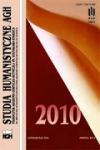POLSCY MIGRANCI W IRLANDII. ROLA SIECI SPOŁECZNYCH W PROCESIE MIGRACYJNYM ORAZ W KSZTAŁTOWANIU SIĘ SPOŁECZNOŚCI ETNICZNEJ
NEW MIGRANTS, NEW COMMUNITIES. POLISH NATIONAL IN IRELAND AFTER THE EU ENLARGEMENT IN 2004
Author(s): Alicja BobekSubject(s): Social Sciences
Published by: Wydawnictwa AGH
Keywords: Ireland; Polish migrants; ethnic community
Summary/Abstract: Although Poland has been a country of emigration for many decades, Ireland has only recently become a destination country for Polish nationals. Most of the Polish migrants in Ireland came to this country directly prior or after the EU enlargement in May 2004. Therefore this community is still in the process of formation, and rapid changes can be observed. Despite the novelty of this migration fl ow, Polish citizens continue one of the largest immigration groups in Ireland. With the current circumstances of the freedom of movement between European Union states, new light can be put on the concepts of migration, ethnic identity and on such concepts as “home” and “belonging”. The aim of this paper is to describe and examine the process of the formation of Polish community in Ireland, showing how this situation differs from the situation of those Polish communities that have already been well established in other countries and how some patterns from the past are still replicated. The main focus of the paper would be analyze the infl uence of the Information and Communication Technologies on both, ethnic community formation and on the relationship between Polish migrants in Ireland, their local communities “back home” and migrants in other countries. I will argue that the traditional concept of “ethnic neighbourhood” does not apply to this community and it has been, to some extent, compensated by the notion of “virtual community”. I will also show the internal division within the community, which are no longer based on differences between migrants cohorts but rather are based on class and cultural capital characteristics. Finally, I will present the place of this community within the larger context of Polish Diaspora. The paper utilises data from my ongoing research on Polish migrants in Ireland. This research utilises qualitative methodology combining fi eldwork, semi-structured interviews and on-line ethnography. In addition to that I have been using data from the Migrants Careers and Aspirations project, part of Trinity immigration research programme.
Journal: Studia Humanistyczne AGH
- Issue Year: 8/2010
- Issue No: 1
- Page Range: 57-67
- Page Count: 11
- Language: Polish

